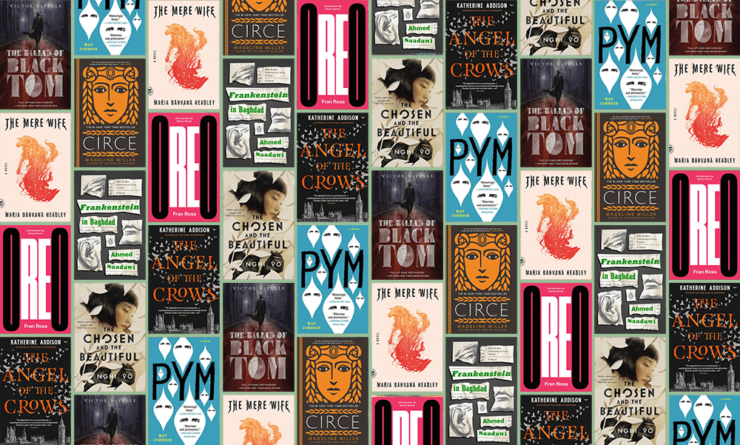One of the most fun turns in culture has been watching writers from a variety of backgrounds take established Western classics and treat them like glorious playgrounds. I personally like many of the books that are considered classics, or part of “the canon”—especially when I was still a student, I enjoyed the sense of testing myself against the books my teachers assigned, and I found that in top-down structure rewarding. I think an agreed-upon canon is an absolute, non-negotiable foundation for a healthy culture. But: the most vital phrase there is “agreed-upon.” Since…well, forever, really, the canon was populated by as many dead white men as U.S. currency, ignoring or actively quashing voices that didn’t agree with a specific narrative about Western civilization.
The current wave of books that are deconstructing and rebuilding the classics are a fantastic addition to the move to make the canon actually representative of our culture—a move that needs to be fought for ceaselessly as our culture literally lives and dies by it. Here are eight books that are doing the work of reshaping the canon to reflect humanity a little better.
The Chosen and the Beautiful by Nghi Vo
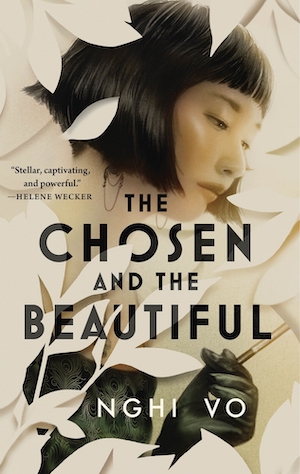
I love The Great Gatsby, truly—I think it’s an incisive look at a moment in American culture, and reading it is like diving, Scrooge McDuck-style, into a vault of sapphires and emeralds. But it’s so white. Just, blistering, gale-force-wind-off-the-tundra white. And sure, if you’re like me, you probably read a lot into Jordan in general, and her weird friendship with Nick in particular, but does that really count as queerness? And can any novel really be called “The Great American Novel” when it leaves out a lot of the people who make America great?
Fortunately for us and future generations, we have Nghi Vo now! She’s written a retelling of Fitzgerald that gives us a genuinely queer Jordan, who is also a Vietnamese…adoptee? Kidnapping victim? Exotic trophy? And a world that bristles with different types of magic, occult speakeasies, and at least one demonic pact, that is also just as gorgeous, on the sentence level, as F. Scott’s original. An excellent addition—or antidote—to high school English classes everywhere.
The Mere Wife by Maria Dahvana Headley
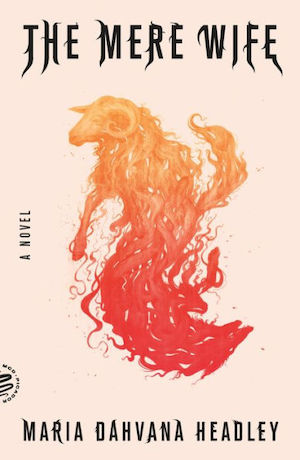
Maria Dahvana Headley brings Beowulf into a modern gated community in a work of poetry and horror that later resulted in her updated translation of the Norse classic. Where John Gardner’s Grendel retold the story from the perspective of Grendel, and treated many of the smaller characters as afterthoughts, Headley tells the story as a cacophony you can imagine hearing a mead hall.
She jumps from Grendel’s mother, Dana, a traumatized war veteran, to Gren himself, an impetuous boy who may or may not be part-monster. She gives us Roger Herot, the alpha male of the gated community that has ravaged lands that used to belong to Dana’s family—and his wife Willa, a take on Wiltheow who is both a sympathetic frustrated artist-turned-trophy, and a suburban queen who’s only too happy to put herself on Roger’s mantlepiece (and ignore his affairs) if it means she can keep her status. Maybe best of all is the blackly comic chorus of the neighborhood’s clutch of elder women, Roger’s mother among them, who are the true rulers of the land. In the end the story becomes an audacious take on a classic, and, in a double-W for the canon, it led to Headley doing an innovative modern translation of the original poem.
Pym by Mat Johnson
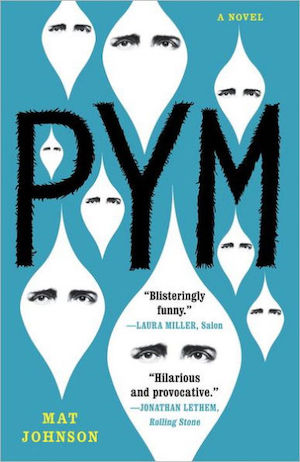
Mat Johnson’s Pym is a modern classic. I’ve written about it before, so has Nisi Shawl. But to give you a brief recap: Chris Jaynes is the only Black professor at a liberal Northeastern college. His bosses really want him to stick to teaching Black authors and serve on the otherwise-all-white diversity committee…at least until this untenable situation escalates to fucking impossible. Jaynes throws himself into his obsession with Edgar Allan Poe’s The Narrative of Arthur Gordon Pym of Nantucket, before finally locating a memoir claiming to be the inspiration for Poe’s novel titled The True and Interesting Narrative of Dirk Peters, Coloured Man, As Written by Himself. With the memoir as his guide, Jaynes scrounges enough money and a hilariously under-qualified crew to voyage to Antarctica to see if they can verify Dirk Peters’ account, and if they can find Tsalal, a mythical land of Black Antarcticans untouched by modern society or colonialism.
Things…do not go to plan. Johnson is a remarkably funny writer, and his set pieces about the expedition weave between lacerating commentary on academia, whiteness, the literary canon, Little Debbie snack cakes, and, somehow, Thomas Kinkade, Painter of Light? This book is extraordinary.
Circe by Madeleine Miller
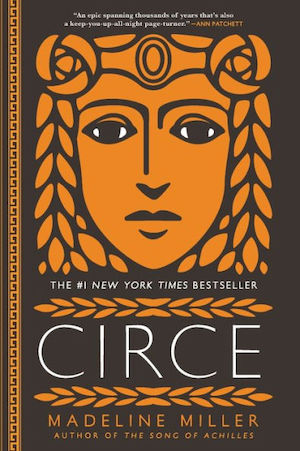
In The Odyssey, we follow Odysseus on a very long voyage home from war. When I read this as a kid most of my sympathies lay with Penelope, abandoned at a loom for 20 years while Odysseus was off ho-ing across the Mediterranean. Madeline Miller does touch on Penelope’s arc, but she’s even more interested in a different woman treated poorly by family and society: Circe, a witch-in-exile whose already difficult life is complicated further by a fling with Penelope’s errant husband—which soon deepens into more than a fling. This is one of those interesting examples where the original is full of magic and gods and cyclops encounters, but the story is so ancient that we learn about this book as a CLASSIC, rather than as either a representation of a vibrant culture or as a fantastical story. We also learn—or at least I did—that good women are meant to live chastely at home with their looms, while more assertive women are witches and monsters that deserve to be used and abandoned by the hero of the story. Miller wrestles that concept to the ground by making Circe the hero, and telling her story in a way that celebrates survival, motherhood, and monstrousness in equal measure.
Oreo by Fran Ross
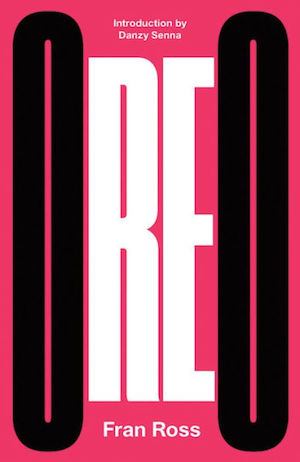
Oreo is one of the great near-lost classics of the 70s, a debut novel from journalist and comedy writer Fran Ross, who tragically died before she could finish a second novel. Luckily for us, the poet Harryette Mullen rediscovered the book in 2000, and New Directions published a new edition, with a foreward by author Danzy Senna, in 2015. (And while we’re at it, have Pym author Mat Johnson’s take!)
On the surface, Oreo is a hilarious slapstick adventure. The title character has lived with her grandparents in Philadelphia while her Black mom tours with a traveling theater troupe, until she decides that she needs to leave home and reconnect with the white, Jewish father who left the family when she was an infant. Beneath that coming-of-age story, Ross retells the myth of Theseus via a slapstick adventure through Philly, New York, labyrinthine subways, and mystical Central Park forests. It is, page for page, the funniest book I’ve ever read—but it also has a genuine heart beating under all the absurdity.
Frankenstein in Baghdad by Ahmed Saadawi, Translated by Jonathan Wright
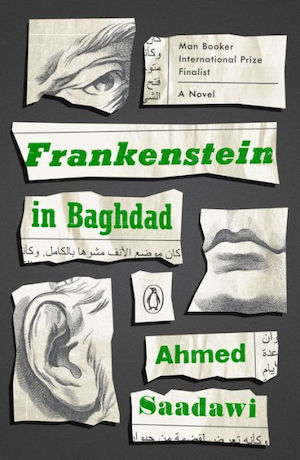
Again, this is a case of a book that is both a classic of SFF and a firmly-ensconced capital-C Classic. Ahmed Saadawi updates Mary Shelley’s tale of goth fuckboi Victor Frankenstein, and turns it into an eviscerating story of war and aftermath.
In U.S.-occupied Iraq, reeling from decades of battle and occupation, Hadi al-Attag takes on the profound work of gathering body parts to give them a proper burial. He stitches them into a human shape, never imagining that the corpse might reanimate—but once “Whatsitsname” comes back to life, he becomes vengeance incarnate. Rather than Shelley’s more personal, feminist take on obsession, abandonment, and motherhood, Saadawi’s book meditates on the idea of justice and mercy in a country destroyed by war.
The Ballad of Black Tom by Victor LaValle
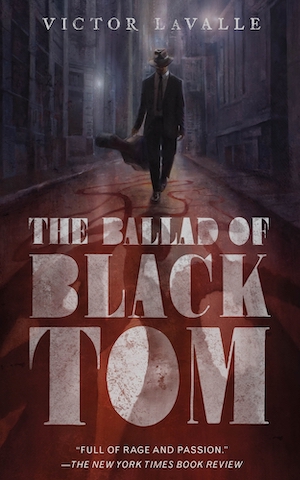
The Ballad of Black Tom is a reply to an H.P. Lovecraft story that, through much exertion and many, many adjectives, somehow surpasses all the rest of his oeuvre to be crowned most racist. Congratulations “The Horror at Red Hook”! The always-fabulous LaValle takes the story and re-centers it on Tommy Tester, a young Black man who uses his limited blues talents to hustle white people who don’t recognize that he’s kind of a hack…until he ends up attracting the attention of a creepy eccentric millionaire named Robert Suydam.
When the cops attack his home in Harlem, Tommy retreats to Red Hook, taking an ambiguous gig with Suydam; eldritch shit ensues. But at the heart of the story is Tommy’s struggle first to create a life for himself in a racist society, and, when that proves impossible, his new mission to beat the white elites at their own squamous game.
Angel of the Crows by Katherine Addison
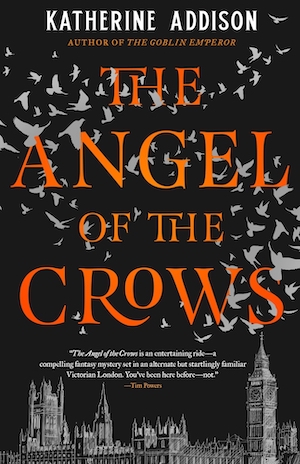
This is a fun one. While Arthur Conan Doyle’s Sherlock Holmes stories are mysteries, not “literary fiction”, it’s fair to say they’re part of the canon. (I read them as assignments in middle school and high school, and later taught them at an academic summer camp—which, if you ever have the opportunity to do that, 10/10 would mold young minds with mystery stories again.) So really what Katherine Addison does here, just as in The Goblin Emperor and the upcoming The Witness for the Dead, is add new layers of genre onto an already genre story until she creates a mighty fiction turducken.
She does this in several fascinating ways. The Angel of the Crows grew out of the “wingfic” subgenre: Sherlock is a literal angel, in an alternate gaslamp London where Angels patrol the streets. And something’s a little off with Watson—but I’m not going to spoil that. Finally the mysteries the two investigate tend to veer into dark fantasy and horror, rather than the realistic intrigues that Doyle gave us.
Also? The whole thing is queer as heck.
***
It’s unbelievably exciting to see so many books that highlight important voices—books that, hopefully, will help future generations of English and Lit students feel that their unique and varied perspectives are important to the cultural conversation. Now that I’ve shared a few of my favorite new spins on the classics, I’d love to hear about yours! Add your recommendations in the comments, and tell us: which canonical works hold up for you, and which ones do you want to see from a new angle?
Originally published June 2021.










